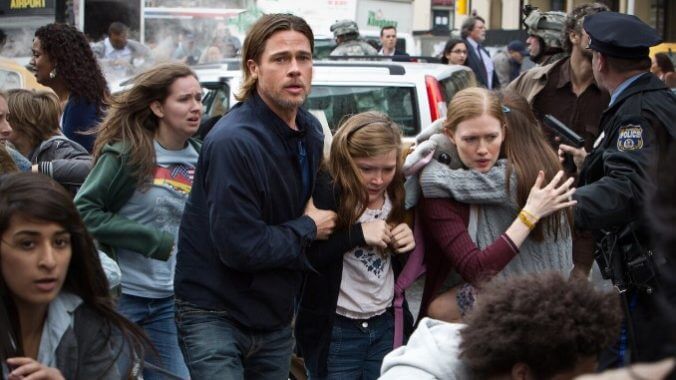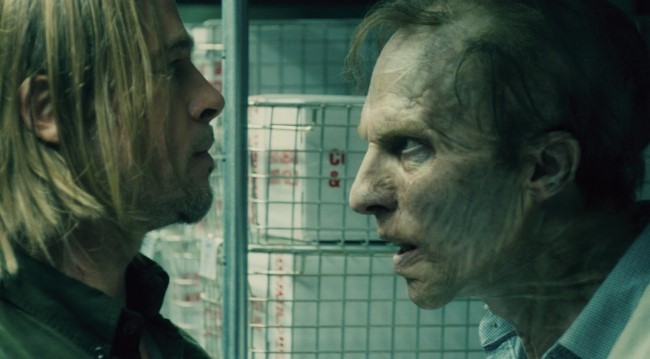World War Z: Massive Zombie Blockbuster, Egregious Abuse of Source Material

When Brad Pitt’s World War Z bulled its way into theaters a decade ago this June, it carried with it the status of a true anomaly. It was the biggest, grandest encapsulation of the zombie genre that had ever been attempted, and indeed it remains so to this day–even in comparison with something like HBO’s The Last of Us, the $190 million budget of World War Z was somehow almost twice as much as the cost of that show’s entire first season. We’re talking about a project that was by far the most expensive piece of zombie fiction ever conceived, and also the highest grossing, raking in more than $540 million worldwide. By most any metric, that would make it the most successful zombie film of all time. All that, despite the fact that World War Z is also one of the most shameless, egregious abuses of pristine source material in recent Hollywood history. Ten years removed, it’s a fitting time to look back and gauge where things went wrong in this adaptation, and why even with its “success,” we never saw a long-rumored sequel.
Author Max Brooks published his influential faux history/epistolary novel World War Z in 2006, in the wake of films such as Shaun of the Dead, Dawn of the Dead (2004) and Land of the Dead (and The Walking Dead comic) reviving some measure of public interest in zombie fiction, which wasn’t exactly in a great place in the 1990s and early 2000s. Striking a much more mature tone than his earlier, comedy-inflected Zombie Survival Guide, Brooks’ book offered a sobering, extraordinarily wide-ranging overview of what human life might look like as it claws its way back from the brink of a great calamity, one that just so happened to be a devastating plague of the living dead. The book lacks a traditional narrative–instead it’s a collection of fictional interviews with people around the world, each detailing aspects of how they survived or contributed during the zombie crisis a decade earlier. Revisiting the book today, Brooks’ deconstruction of human fallibility and governmental incompetence rings all the more true in the wake of the COVID-19 pandemic we all endured–most of the author’s conjecture on how the zombie plague could realistically spread and be aided by bad actors and willful neglect for public safety now feels especially prescient, and you can imagine someone writing a piece just like World War Z about the COVID years.
To be sure, there had been plenty of zombie fiction before World War Z, but where Brooks’ text makes itself unforgettable is in the breadth of his considerations, tackling segments of society you’ve never seen depicted in a zombie movie. Soldiers and researchers? Those perspectives are to be expected in a zombie story. But Brooks explored the roles that might be played by seemingly every link in the great human chain–suburban parents and children, logistics experts, teenage Japanese otaku, cargo pilots, mercenaries, Hollywood filmmakers, even astronauts who happen to be in orbit when the zombie outbreaks begin. He goes out of his way to make an allegorical but inherently silly premise–the zombie apocalypse–seem as grounded and genuinely feasible as it could possibly be. His efforts root us in the mundane, everyday humanity of each character. The lauded audiobook adaptation shows just how well the format works.
And from its opening moments, it’s all too clear that director Marc Forster’s tepid film version of World War Z won’t be doing any of this. Gone is the slow encroaching anxiety of the plague as it gradually spreads through the globe over the course of years in Brooks’ book. Gone is the vast government conspiracy to cover up the severity of the problem, and the profiteering fake placebo medication intended to placate the American populace into complacency while the people in charge deal with the problem. In the film, the zombies seemingly spring up overnight on a global basis, a genesis point that admittedly has more in common with the original George Romero movies that inspired all modern zombie fiction, but a dramatic departure from the careful consideration that the novel gives as to how society could ever let the problem become one where the entire species is in jeopardy. Everything in the film has been rushed and compressed, jumping straight from “these news reports are weird, huh?” to “THE PRESIDENT IS DEAD AND SOCIETY HAS CRUMBLED” in the space of about 12 hours. We’re robbed of the tragedy that Brooks conveys, the sense that this all could have been prevented had people in authority come together to tackle the emerging problem in an earnest way, rather than downplaying and hiding it. The film’s zombies spring seemingly out of the ether, rampaging so unstoppably that it removes the audience’s inclination to even bother assigning blame–because who could have hoped to stop a problem that rears to life so suddenly? The critique of governmental inefficiency is entirely lost.
What the film gives us instead is a conventional Hero to focus on–a genuine, red-blooded American Movie Star in the form of Brad Pitt’s Gerry Lane, a “Former United Nations WMD investigator” who is immediately tagged by the remnants of the government, for reasons never adequately explained, as the one guy they can trust to track down the “source” of the plague. We’re told that by finding the “origin,” the eggheads in R&D can hopefully whip up a vaccine or cure for the remaining 10% of humanity that hasn’t apparently been wiped out in the last 24 hours–if this seems difficult to swallow, don’t worry, it never actually comes to pass. The source of the virus is ultimately of zero importance at all, merely serving as an excuse for Lane to jet from one expensive locale to another, expendable crew of Navy SEALs in tow. Wherever he goes, chaos quickly follows, as if his arrival somehow inevitably brings disaster with it, most notably in the Jerusalem sequence wherein the city’s protective wall is immediately overwhelmed by army ant-like zombies literal moments after Pitt arrives to marvel at it.
-

-

-

-

-

-

-

-

-

-

-

-

-

-

-

-

-

-

-

-

-

-

-

-

-

-

-

-

-

-

-

-

-

-

-

-

-

-

-

-









































